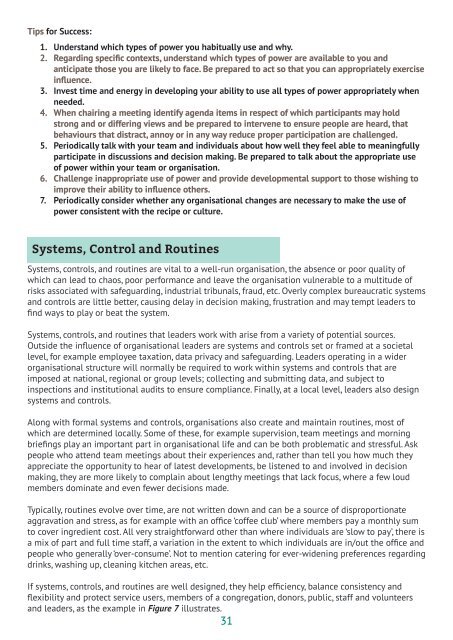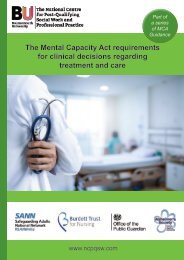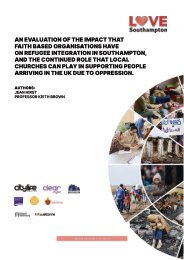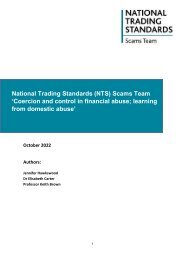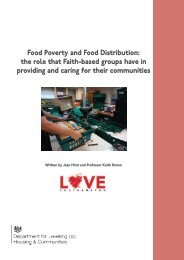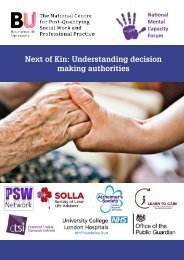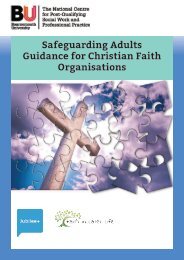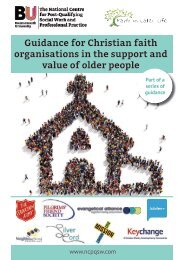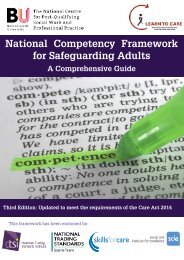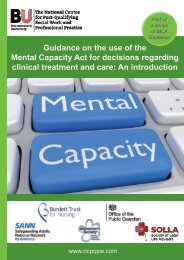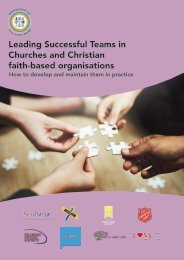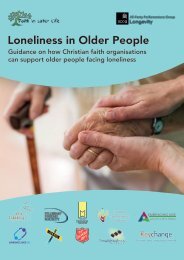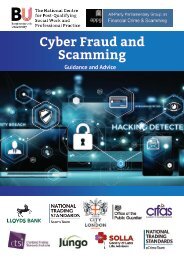Burnout in Churches and Christian Faith-Based Organisations
Burnout is a “syndrome of emotional exhaustion, depersonalization and reduced personal accomplishment that can occur among individuals who work with people in some capacity (Maslach 1996:193). This definition, whilst helpful, fails to convey the potentially life-shattering impact that burnout can have, as described in the words of ‘Peter’, a Christian leader who contributed to this guidance.
Burnout is a “syndrome of emotional exhaustion, depersonalization and reduced personal accomplishment that can occur among individuals who work with people in some capacity (Maslach 1996:193).
This definition, whilst helpful, fails to convey the potentially life-shattering impact that burnout can have, as described in the words of ‘Peter’, a Christian leader who contributed to this guidance.
Create successful ePaper yourself
Turn your PDF publications into a flip-book with our unique Google optimized e-Paper software.
Tips for Success:<br />
1. Underst<strong>and</strong> which types of power you habitually use <strong>and</strong> why.<br />
2. Regard<strong>in</strong>g specific contexts, underst<strong>and</strong> which types of power are available to you <strong>and</strong><br />
anticipate those you are likely to face. Be prepared to act so that you can appropriately exercise<br />
<strong>in</strong>fluence.<br />
3. Invest time <strong>and</strong> energy <strong>in</strong> develop<strong>in</strong>g your ability to use all types of power appropriately when<br />
needed.<br />
4. When chair<strong>in</strong>g a meet<strong>in</strong>g identify agenda items <strong>in</strong> respect of which participants may hold<br />
strong <strong>and</strong> or differ<strong>in</strong>g views <strong>and</strong> be prepared to <strong>in</strong>tervene to ensure people are heard, that<br />
behaviours that distract, annoy or <strong>in</strong> any way reduce proper participation are challenged.<br />
5. Periodically talk with your team <strong>and</strong> <strong>in</strong>dividuals about how well they feel able to mean<strong>in</strong>gfully<br />
participate <strong>in</strong> discussions <strong>and</strong> decision mak<strong>in</strong>g. Be prepared to talk about the appropriate use<br />
of power with<strong>in</strong> your team or organisation.<br />
6. Challenge <strong>in</strong>appropriate use of power <strong>and</strong> provide developmental support to those wish<strong>in</strong>g to<br />
improve their ability to <strong>in</strong>fluence others.<br />
7. Periodically consider whether any organisational changes are necessary to make the use of<br />
power consistent with the recipe or culture.<br />
Systems, Control <strong>and</strong> Rout<strong>in</strong>es<br />
Systems, controls, <strong>and</strong> rout<strong>in</strong>es are vital to a well-run organisation, the absence or poor quality of<br />
which can lead to chaos, poor performance <strong>and</strong> leave the organisation vulnerable to a multitude of<br />
risks associated with safeguard<strong>in</strong>g, <strong>in</strong>dustrial tribunals, fraud, etc. Overly complex bureaucratic systems<br />
<strong>and</strong> controls are little better, caus<strong>in</strong>g delay <strong>in</strong> decision mak<strong>in</strong>g, frustration <strong>and</strong> may tempt leaders to<br />
f<strong>in</strong>d ways to play or beat the system.<br />
Systems, controls, <strong>and</strong> rout<strong>in</strong>es that leaders work with arise from a variety of potential sources.<br />
Outside the <strong>in</strong>fluence of organisational leaders are systems <strong>and</strong> controls set or framed at a societal<br />
level, for example employee taxation, data privacy <strong>and</strong> safeguard<strong>in</strong>g. Leaders operat<strong>in</strong>g <strong>in</strong> a wider<br />
organisational structure will normally be required to work with<strong>in</strong> systems <strong>and</strong> controls that are<br />
imposed at national, regional or group levels; collect<strong>in</strong>g <strong>and</strong> submitt<strong>in</strong>g data, <strong>and</strong> subject to<br />
<strong>in</strong>spections <strong>and</strong> <strong>in</strong>stitutional audits to ensure compliance. F<strong>in</strong>ally, at a local level, leaders also design<br />
systems <strong>and</strong> controls.<br />
Along with formal systems <strong>and</strong> controls, organisations also create <strong>and</strong> ma<strong>in</strong>ta<strong>in</strong> rout<strong>in</strong>es, most of<br />
which are determ<strong>in</strong>ed locally. Some of these, for example supervision, team meet<strong>in</strong>gs <strong>and</strong> morn<strong>in</strong>g<br />
brief<strong>in</strong>gs play an important part <strong>in</strong> organisational life <strong>and</strong> can be both problematic <strong>and</strong> stressful. Ask<br />
people who attend team meet<strong>in</strong>gs about their experiences <strong>and</strong>, rather than tell you how much they<br />
appreciate the opportunity to hear of latest developments, be listened to <strong>and</strong> <strong>in</strong>volved <strong>in</strong> decision<br />
mak<strong>in</strong>g, they are more likely to compla<strong>in</strong> about lengthy meet<strong>in</strong>gs that lack focus, where a few loud<br />
members dom<strong>in</strong>ate <strong>and</strong> even fewer decisions made.<br />
Typically, rout<strong>in</strong>es evolve over time, are not written down <strong>and</strong> can be a source of disproportionate<br />
aggravation <strong>and</strong> stress, as for example with an office ‘coffee club’ where members pay a monthly sum<br />
to cover <strong>in</strong>gredient cost. All very straightforward other than where <strong>in</strong>dividuals are ‘slow to pay’, there is<br />
a mix of part <strong>and</strong> full time staff, a variation <strong>in</strong> the extent to which <strong>in</strong>dividuals are <strong>in</strong>/out the office <strong>and</strong><br />
people who generally ‘over-consume’. Not to mention cater<strong>in</strong>g for ever-widen<strong>in</strong>g preferences regard<strong>in</strong>g<br />
dr<strong>in</strong>ks, wash<strong>in</strong>g up, clean<strong>in</strong>g kitchen areas, etc.<br />
If systems, controls, <strong>and</strong> rout<strong>in</strong>es are well designed, they help efficiency, balance consistency <strong>and</strong><br />
flexibility <strong>and</strong> protect service users, members of a congregation, donors, public, staff <strong>and</strong> volunteers<br />
<strong>and</strong> leaders, as the example <strong>in</strong> Figure 7 illustrates.<br />
31


